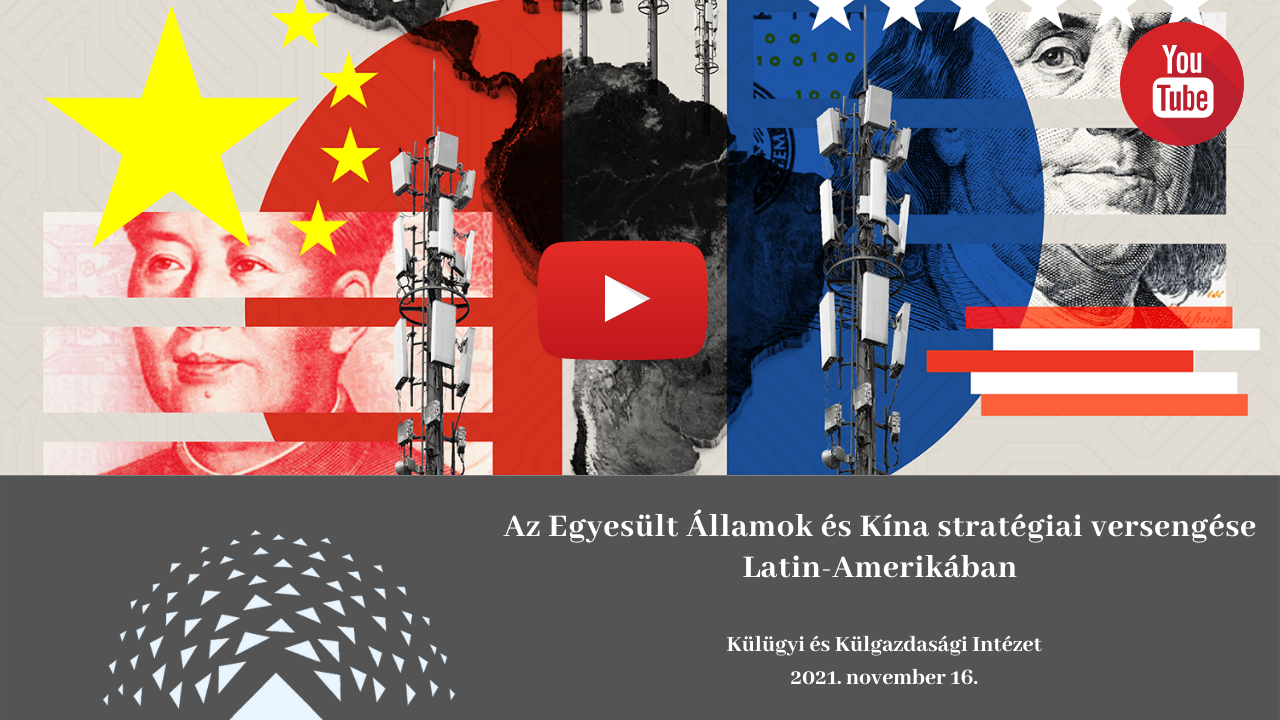The Institute for Foreign Affairs and Trade (IFAT) held a roundtable discussion entitled “Strategic competition of the United Stated and China in Latin America” on 16 November 2021. The event was moderated by Béla Soltész (Senior Research Fellow at IFAT) and the panelists were Bernadett Lehoczki (Associate Professor at Corvinus University of Budapest), Dávid Vogel (Senior Research Fellow at the University of Óbuda) and Viktor Eszterhai (Senior Research Fellow at IFAT).
Bernadett Lehoczki approached the topic from the perspective of Latin American countries. She showed that Latin American countries should be seen as semi-peripheral in terms of the global world order. Their significance lies, among other things, in the fact that the dual results of the reforms that took place in them led to the crisis of the liberal international order. The U.S. has turned away from the multilateral frameworks it has created. The countries of the Latin American region have always been sensitive to their national sovereignty, a situation that China is consciously seizing, as it does not impose political conditions on its economic relations. Latin American countries have never been so embedded in the liberal side that it is not a dilemma for them on which side of the dividing line between liberal and authoritarian regimes they are today. Today, many countries in the region are no longer the U.S. but China’s primary trading partner, a new player in the region that has achieved economic success in a different way from the Western model. It also helps them as lenders and investors, while giving them a stronger negotiating position on the international stage. Although Latin American countries are unable to secede from the U.S. due to their geographical location and are culturally attached to Western civilization, their economic identities are shifting more toward developing and emerging countries.
In his analysis, Viktor Eszterhai presented the Chinese aspects. For China, the importance of Latin America grew when its own resources began to run out in the late 1990s and it had to seek new sources of imports. Relations with the region flourished in the 2000s, contributing to the fact that it did not displace but complement the former Western presence, helping to diversify the countries’ trade and economy. Cooperation is also facilitated by international political considerations, as China seeks to transform the international order as a leader in developing countries. Relations between the region and China peaked in the post-financial crisis of 2008, when China initiated more intensive investment in the sectors of interest to it. However, with the expiration of the post-crisis rescue package, China has begun to steer its economy towards a new growth path, meaning it is less in need of Latin American raw materials in addition to emerging as a competitor in the region with its higher value-added products. However, the unfolding trade war between the U.S. and China in recent years has given another impetus to China’s further strengthening of its position in the region. In addition, the Covid-19 pandemic has revealed to countries in the region that they are powerless without China’s help. China is trying to build connectivity in the region, gradually undermining the former regional role of the U.S.
Dávid Vogel spoke about the security policy relevance of the Latin American region, stressing that the region cannot be treated uniformly. In his presentation, he mentioned migration, drug trafficking, international organized crime and terrorism as key security policy aspects. China is in an easier position because it does not have to deal with migration and drug trafficking due to its geographical location, but seeks to cooperate with countries in the region in the fight against international organized crime and terrorism. Other security policy dilemmas include the Brazil-Paraguay-Argentina and Peru-Chile-Bolivia triple borders, tensions between Venezuela and Colombia, and waves of protests in Latin America. It is also important for China in the region that nine Latin American countries recognize Taiwan. This number is likely to decline further in the near future, which could provide additional investment opportunities for China in the region.
At the end of the panel discussion, several issues were raised regarding, among others, Brazil, Chinese mask and vaccine diplomacy, the withdrawal of the U.S. from the region, the Venezuelan crisis and Cuba.
For the full recording please click on the link below or visit our YouTube-channel!
JTNDaWZyYW1lJTIwd2lkdGglM0QlMjIxMDAlMjUlMjIlMjBoZWlnaHQlM0QlMjI0NTAlMjIlMjBzcmMlM0QlMjJodHRwcyUzQSUyRiUyRnd3dy55b3V0dWJlLmNvbSUyRmVtYmVkJTJGSjJBc3IyUjZCRHMlMjIlMjB0aXRsZSUzRCUyMllvdVR1YmUlMjB2aWRlbyUyMHBsYXllciUyMiUyMGZyYW1lYm9yZGVyJTNEJTIyMCUyMiUyMGFsbG93JTNEJTIyYWNjZWxlcm9tZXRlciUzQiUyMGF1dG9wbGF5JTNCJTIwY2xpcGJvYXJkLXdyaXRlJTNCJTIwZW5jcnlwdGVkLW1lZGlhJTNCJTIwZ3lyb3Njb3BlJTNCJTIwcGljdHVyZS1pbi1waWN0dXJlJTIyJTIwYWxsb3dmdWxsc2NyZWVuJTNFJTNDJTJGaWZyYW1lJTNF

